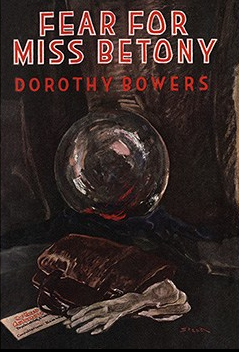Fifteen years have passed since I discussed Dorothy Bowers' 1941 novel on this blog, although at that time I'd read the American reprint issued by the late, lamented Rue Morgue Press and so I referred to the novel by its slightly different American title, Fear and Miss Betony. It's a well-written novel and I decided to take another look at it, this time from the writer's perspective as much as the reader's.
One thing that has changed in the intervening years is that I've acquired a lovely inscribed copy of this book. In inscribing the book to someone called R.H. Naylor, Bowers quotes from 'All's Well that Ends Well': 'We, the poorer born, whose baser stars do shut us up in wishes'. Every time I think of Bowers, my admiration is mixed with the poignant reflection that she could have achieved so much had her life not been so cruelly cut short by TB.
As for the story, I've come to the conclusion that - for all its merits - the structure is lop-sided. The story is very, very different from A Shilling for Candles by Josephine Tey, another very well-written book that doesn't work as well as it should have done, but there are one or two resemblances. I suspect that Bowers enjoyed writing about Emma Betony so much that she focused too much on the story's very slow build-up. As a result, various revelations come in a rush at the end, when her usual detectives, Pardoe and Salt, make a belated appearance.
As with the Tey novel, I think she could have made more of the basic situation. Agatha Christie was not as accomplished a prose stylist as either Tey or Bowers, but she would have dealt with the mystery element of the book carefully and effectively, of that I'm pretty sure. But it's worth emphasising that there are many compensations, including the period detail and an insight into the attitudes of the time, especially towards older people. At the start of the story, Emma Betony is sixty-one years old and everyone treats her as though she has nine toes in the grave. Shame! Anyway, she proves to be a lively and intelligent woman and I enjoyed sharing her company once again.
